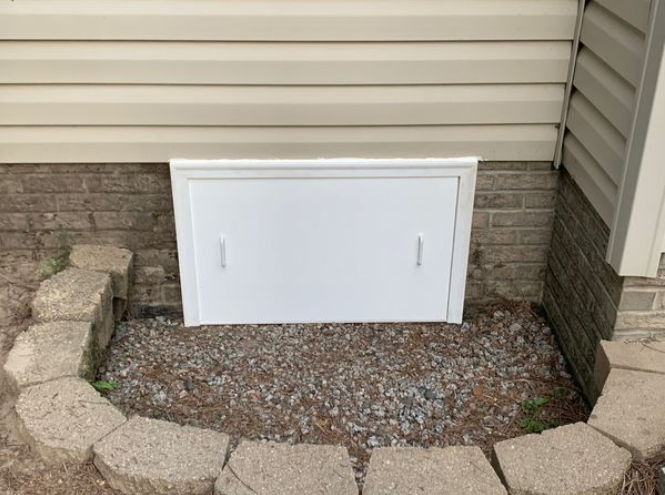You probably don’t think about your crawl space often, but words like dark, damp, and dirty come to mind when you do. You can try to ignore this space, but neglecting it only leads to unfavorable conditions.
Crawl spaces can mimic the outdoors, so factors like extreme temperatures, humidity, and uninvited pests become issues. You might start wondering if there is an effective way to keep this area safe and dry. Good news — there is! You can ensure your crawl space door is tightly sealed.
Having a tight seal on the access door will prevent moisture and pests and help manage the temperature. You can learn how to achieve an airtight seal by following a few simple steps.
Importance of Having an Airtight Crawl Space Door
An airtight crawl space door can benefit your home in many ways. It’s essential for preventing costly issues like water damage and unwanted pests. Aside from the expensive repairs, these issues threaten your home’s structural integrity and indoor air quality. Ensuring your crawl space door is airtight helps manage several problems.
Prevents Water Intrusion
Airtight crawl space doors help keep water from entering the space. Whether the water comes from rain, snow, or another source, it can cause a lot of damage.
Provides Moisture Control
Most crawl spaces are prone to moisture buildup, which can lead to mold growth, structural damage, and health issues. A properly sealed crawl space door can help regulate moisture levels.
Protects From the Weather
Extreme weather conditions can cause the temperature in your crawl space to fluctuate. An airtight door can help insulate the area and maintain a steady temperature.
Improves Energy Efficiency
A well-sealed crawl space door helps prevent fluctuating temperatures by preventing heat transfer and air leakage. Your HVAC system won’t have to work as hard to maintain a consistent temperature throughout your home.
Enhances Indoor Air Quality
When there’s a tight seal around the crawl space door, it can block external air. This keeps humidity and pollutants from entering your home. Without these extra contaminants swirling about, your indoor air quality improves.
Provides Pest Control
An unsecured crawl space is heaven for rodents, insects, and other pests. Its dark, damp conditions are ideal, making it attractive for these creatures. An adequately sealed door can prevent these intruders from entering and protect your home from the damage they cause.
Making an Airtight Crawl Space Door
Getting an airtight seal around your crawl space door starts with a door that fits correctly. We offer all standard-sized but also custom fits! Once you have a perfectly fitted door place weather-stripping foam around its edges. Measure the perimeter of the door frame and cut the material to the appropriate lengths. Peel off the backing and press it firmly around the door frame, creating a tight seal when you close it.
Use a good silicone caulk to fill any cracks or openings in the vents or where the concrete meets. This material seals any remaining gaps. Ensure you have an exterior-grade caulk designed for use around doors.
The last thing you can do to create an airtight seal is add a door sweep. It closes the gap between the door and the floor, blocking anything from entering your home.
How to Tell Whether Your Crawl Space Door Is Airtight
If you have a crawl space, the air inside it will most likely affect your home. How much and what kind of air comes in depends on how well-sealed the door is. If you notice these signs, you’ll know the seal is weakened, and it’s time to take action.
Certain Areas of Your Home Feel Humid
It’s natural for your home to feel humid at some point throughout the year. However, if only certain areas feel affected, especially near the crawl space door, it may not have a tight seal.
You Feel Drafts and Temperature Fluctuations
If you feel warm or cold air coming through the edges of the door, you have an air leak. Rooms near the crawl space may also have noticeable temperature variations, feeling warmer in summer and colder in winter.
Sometimes, a visual inspection will allow you to locate the gap. Close the door and check around the edges. Use a flashlight from the inside to see if light shines through. You have an air leak if someone on the other side can see your flashlight.
You Have Higher Energy Bills
Even if you haven’t changed the settings on your thermostat, you may notice increasing energy bills. Air leaks can cause your heating and cooling system to work harder to keep consistent temperatures. This additional work leads to higher energy bills.
You Notice Increased Noise
Crawl space doors aren’t soundproof. However, they will mute some of the sounds coming in from outdoors. If you hear more noises, your door might have a poor seal.
To test this, close the door and listen carefully for external sounds. You may hear cars passing by or children playing even though you have never noticed these noises before.
Wooden Door
Your door is made from wood and has warped or changed shape due to the weather over time. Or it is made from metal and has rusted through. If either of these is the case, you want to invest in a high-quality PVC door to ensure your crawl space can remain airtight.
High-Quality Custom Crawl Space Doors
A custom door from Cathmer will best fit your crawl space, preventing air leaks, intrusive moisture, and unwanted pests. Start shopping today with your dimensions so we can start your project!

